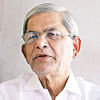Reform panels aim to ensure power balance

Four reform commissions are set to submit their reports to the government tomorrow and the Constitution Reform Commission and the Electoral Reform Commission are likely to propose a caretaker government system and a bicameral parliament.
The Police Reform Commission may recommend allowing the police to use only non-lethal weapons in crowd control to prevent loss of lives, adhering to the standards set by European countries.
The Anti-Corruption Commission Reform Commission is considering a recommendation to bar bureaucrats from holding secretary- to director-level positions at the ACC.
According to sources in the Constitution Reform Commission, its proposals may include a two-term limit for prime ministers to curb the head of government's absolute power. It may also recommend establishing a balance of power between the prime minister and the president.
The commission is also likely to recommend bringing the minimum age to 21 from 25 to run for parliament.
Meanwhile, the Electoral Reform Commission is expected to recommend the formation of a high-level parliamentary committee, under the Speaker, with representatives from political parties, that would hold election commissioners accountable for any irregularities during elections.
Additionally, the Electoral Reform Commission is considering a dual voting system. The first-past-the-post (FPTP) method, where the candidate with the most votes wins, is suggested for the lower house of parliament. For the proposed upper house, the commission is likely to recommend a proportional representation system, said a member of the reform commission without elaborating further.
Ali Riaz, chief of the Constitution Reform Commission, Badiul Alam Majumdar, chief of the Electoral Reform Commission, Iftekharuzzaman, chief of the ACC Reform Commission and Safar Raj Hossain, chief of the Police Reform Commission, confirmed this newspaper yesterday that they are set to submit their reports tomorrow.
"The balance of power will not be limited to the president and prime minister. A balance of power will be established by creating more institutions to place the government's executive branch under surveillance and prevent the prime minister's misuse of power," Ali Riaz told The Daily Star yesterday.
Badiul said their recommendations would be discussed internally within the government and also with political parties. He hopes these discussions will lead to a consensus.
After taking charge in August, the interim government formed at least 15 reform commissions to strengthen weakened democratic institutions, and establish a state system rooted in public ownership, accountability, and welfare.
The first six commissions for reforming the constitution, electoral system, police, judiciary, public administration, and the ACC were formed on October 3. They were given 90 days to submit their reports.
The deadline for the Judiciary Reform Commission was extended to January 31 and the remaining five to January 15.
OTHER RECOMMENDATIONS
The Constitution Reform Commission is likely to recommend the inclusion of equality, human dignity, and social justice in the preamble to the constitution in line with the proclamation of the 1971 Liberation War.
The commission plans to propose enhancing parliamentary standing committees' ability to monitor the government's activities and hold the executive branch and prime minister accountable. It will also recommend repealing Article 70 of the constitution, which practically stops MPs from voting against party lines.
The Electoral Reform Commission is set to recommend the reintroduction of "No" vote option on ballot papers and direct election to seats reserved for women. The commission is also in favour of increasing the seats for women to 100 from 50, and the total number of lawmakers in the lower house to 400 from 350. It is likely to recommend 100 seats for the upper house.
Members of the commission said they were likely to recommend a non-party caretaker government system ahead of polls, amending the law for the appointments of election commissioners and their chief, increasing the EC's authority under the Representation of the People Order (RPO), and making the EC more accountable.
They are also considering recommending provisions that will require candidates to disclose their foreign assets in their affidavits and the verification of the information provided in the affidavit.
Sources in the Police Reform Commission said that their recommendations might include freeing law enforcement agencies from political influence.
They will also stress the importance of reducing corruption and ensuring accountability through exemplary punishment of offenders in law enforcement agencies.
The commission is likely to propose guidelines following High Court Division and Appellate Division directives regarding arrests without warrants under Section 54 of the Code of Criminal Procedure (CrPC) and the treatment of individuals on remand under Section 167 of the CrPC.
These directives include: police officers must disclose their identity and present ID cards after arresting the suspects; reasons for arrests must be recorded in a register; relatives of the arrestee must be informed within an hour; detainees should have access to a lawyer or relatives; interrogations during remand must occur in a designated room with a transparent glass wall, where a lawyer or relative can observe the proceedings.
The ACC Reform Commission is likely to recommend ensuring the appointment of neutral persons as ACC commissioners and chairman. The reform commission is likely to propose repealing the controversial section 54 of the ACC Employees (Service) Rules. The section gives the ACC secretary absolute authority to transfer investigation officers. It also permits the dismissal of employees without prior notice.
Employees argue that this provision undermines their ability to conduct independent and impartial investigations.
According to sources, the commission may recommend expanding the current three-member ACC to a five-member body by amending the Anti-Corruption Commission Act-2004. Additionally, the commission is considering a proposal to establish integrated ACC offices in all 64 districts, up from 36.

 For all latest news, follow The Daily Star's Google News channel.
For all latest news, follow The Daily Star's Google News channel. 






Comments